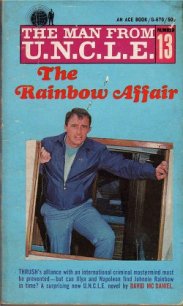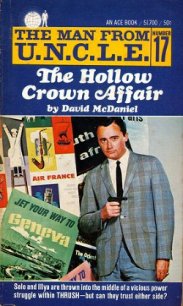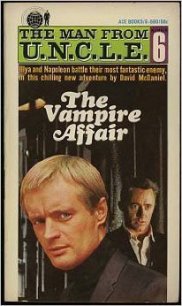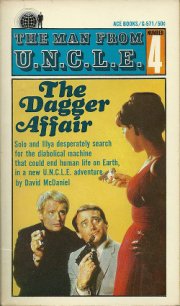The Utopia Affair - McDaniel David (электронные книги без регистрации TXT) 📗
"How much of this is known around town already?"
"All of it. The guy who drove up here phoned it to a paper in Winnipeg for twenty-five dollars. Tomorrow the whole province will know. I'm already planning to look into it, sir; I just wanted to be sure you knew what was going on in case something happened. I'm pretty much on my own up here."
"Thank you," said Napoleon. "But bear this in mind, Mr. DeWeese: raw courage alone does not win battles. If this becomes more than you can manage single handed, don't hesitate to call for backup forces.
"I plan to live to a ripe old age, sir, but I want to find out a little more before 1 cost the organization money. I'll give you a call back if I touch on anything I can't put in my pocket."
"Very good. Best of luck."
"Thank you, sir."
The connection was terminated, and Napoleon turned his chair to a large microfilm file reader. He punched a combination of buttons and found DeWeese. A former guide, six foot three, two hundred and thirty pounds, IQ 175, responsible for maintaining U.N.C.L.E.'s watch over half a million square miles of desolation where, as the poet has said, the Northern Lights have seen strange sights.
One of the strangest, he thought, must be a thing as big as a mountain, with glowing red eyes, that stood still and reversed direction in a stiff and steady breeze, and had silently menaced the town of Cranberry Portage. Solo had to suppress an automatic smile at the image of the rural name, and suddenly remembered that tonight was All Hallows Eve. What a way to celebrate, he thought wryly.
He glanced at the master clock. The evening reports from Honolulu would be coming in shortly; the West Coast had been processed... and there was that repeated attempt at a coup in Tierra Caliente. Something would have to be done about the men behind it; tomorrow morning would be soon enough. Even if the revolution was backed by Thrush, the soldiers would demand their rest at night. He wished he could do the same.
He sighed. It looked as if this could become a full-time job. He tapped the intercom for the night girl— what was her name, now... Cindy? She answered and he said, "Can you dodge all my calls for about half an hour after Hawaii checks in? I think I'd better take off to close my apartment and pick up a few items. Don't bother with a driver; I can catch a taxi up First."
"I'll put a lock on your line, sir. Signal me as soon as you come back in."
"Right."
Napoleon dug his knuckles into his eyes and sorted quickly through the things he would have to do to move in here for a few weeks. His apartment could be secured in a moment; his toilet kit was always packed and ready to go, and he'd probably need a fresh shirt. It looked as if it was going to be a long six weeks.
Section II "A Principality In Utopia."
Chapter 5
"We Could Use A Man Like That."
BY THE END of his first week there, Alexander Waverly was becoming adjusted to life in Utopia. He wasn't quite used to it yet, and he was determined he would never be able to like it, but he was able to find his way around without a map and knew four of the staff on a first-name basis. He'd had six quiet days to observe the activities that were going on about him, and as a guest he had certain privileges of movement which enabled him to study the operations of "The Park" more carefully.
His data added up to a picture similar to that he had imagined, but quite a bit larger. There was a fair-sized atomic power pile under the hill which was the Park's eastern wall, supplying electric power and fresh water, steam heat and an endless supply of low-grade but marketable radioactive by-products. The brochure had mentioned a radio blanket over the entire area, but he had observed Park personnel using something which looked very much like a radio for communication. He wondered how they did it, and made that his next point of interest.
Meanwhile there was the day-to-day life of the resort to be coped with. Every effort was being made to find something to occupy his time for the next month, and no expenses were spared in Utopia to keep the guests happy. Waverly hardly felt he was unique among the clientele in being taken forcibly from a job he enjoyed; he was even reasonably certain that Utopia would be prepared to deal with a certain amount of recalcitrance among the inmates. After all, the staff members were there essentially to determine that anyone paying the appropriate fee would enjoy himself whether he wanted to or not. He gave himself credit for no more stubbornness than any top executive; if they could be won over, so could he. But the staff would have a job trying.
Meanwhile, he had to pick some kind of directed activity to occupy the next four weeks. It wasn't required, but he dreaded the idea of having nothing at all to do. Much as his inner being rebelled at the thought of joining the other overgrown children in their play therapy, it was preferable to wandering through the woods and dabbling in the artificially maintained brooks. Of all the choices he had been offered, the least distasteful was a sort of war game; he had seen a brochure on it shortly after his arrival. Apparently two total strangers acted as Generals in a series of maneuvers, rather strictly regulated, using live troops in a simulated battle situation.
He would sign up for this game and hope for the luck of the draw to bring him an interesting and challenging opponent. He had enough faith in the abilities of the omnipresent staff to pair him with a near equal so that he was not seriously concerned with the danger of boredom in the next month.
He proved correct. As Mr. Dodgson he entered his name, and in due process he received a note informing him that he had drawn a Mr. Silverthorne. Silverthorne was listed in the guest directory with the terse identification Executive. His residence was #12, diagonally across the residential area, a little over a mile away.
An exchange of polite notes by the pneumatic postal service, and they arranged a meeting at the Lodge. It was mid-afternoon when Alexander Waverly entered the cool dimness of the log-walled building and saw the man against whom he would soon be waging war. As he approached the table, a long dark man unfolded himself from a chair and extended a hand.
"Mr. Dodgson? My name is Silverthorne."
Waverly studied the man's face for a moment as he answered. His opponent was perhaps fifty-five or sixty, and well maintained. His black hair was touched up slightly, though it took a perceptive eye to catch it. Only his eyes seemed out of place, bright and alert, darting here and there in an otherwise impassive face. He stood almost three inches taller than Waverly.
"How do you do, Mr. Silverthorne. I'm told we are to go to war over something or other."
Silverthorne smiled. "Participation seemed preferable to inaction. This pretend-war appeared to be the most potentially challenging diversion the Park offered."
"My situation precisely. Is this your first participation in their games?"
"The war game has been added since my last visit. My company insisted I needed a vacation."
Waverly admitted the similarities in their positions, and by the time dinner was laid in the main dining hall they were fairly well acquainted. The subject of their respective backgrounds had not come up—one of the first things Waverly had observed was that they generally didn't. It was considered bad form to inquire into another guest's outside life. Some were there who could not hide—celebrities from entertainment, politics, science and industry, whose faces were known around the world. But the Prime Minister of India was listed in the directory as Politician, the star of the most popular British comedy series was listed as Artist, and the top Russian nuclear researcher was a Technician. A guest could mention his own background if he wanted to, but it wouldn't impress anyone, and the occasion to do so rarely came up.




